
| INTERVIEW WITH
STEVEN WILSON 01/23/2013 (italian
version) by Giancarlo Bolther and Laura Medei |
First of all, The Raven that refused to sing, your third album. Could you describe the creative process that stands behind it? Yes, the idea was to write music specifically for my live band to play and that’s a very different creative process to the one of Grace for Drowning or Insurgentes, my first two solo records which were very much written without any particular musicians in mind, so I wrote the music then I found some people who can play it. This time around I knew exactly which musicians would be playing the music, so I was able to write for their own musical personalities, and I knew that they could play music at a higher level then I had ever really conceived that before, so what was interesting about when I was writing the album was I was actually pushing myself to write music at a level higher than I could play, I mean I can’t play this music but I knew that they could, so it’s one thing to imagine music, it’s another thing to perform it. In that respect, I may say that the creative process behind this work is the combination of my imagination and their abilities as musicians. A different experience for me, I’ve never push myself before to write music at a level that I couldn’t play myself, so it made it a kind of an exciting process. How did you choose the six stories for the record? Oh… I don’t know, I guess... Well, the first thing I did was to write short stories. Literally not lyrics but stories, very much in the tradition of the classical supernatural ghosts story, not like a modern supernatural story, more like the classical, almost in the gothic tradition. I wrote so many stories, just for fun really, at the same time I was writing the music for the record without really having any idea about what the lyrics would be about. The first piece I wrote was Luminol, the second piece I wrote was The Watchmaker, and both of those pieces of music has pure instrumental pieces so that seemed to me to be telling a story just through the music. The six pieces are all inspired by this idea of the classical ghosts supernatural stories. As the way the specific ideas came from… who knows? I don’t know, I’ve stolen them from somewhere, I don’t know where! |
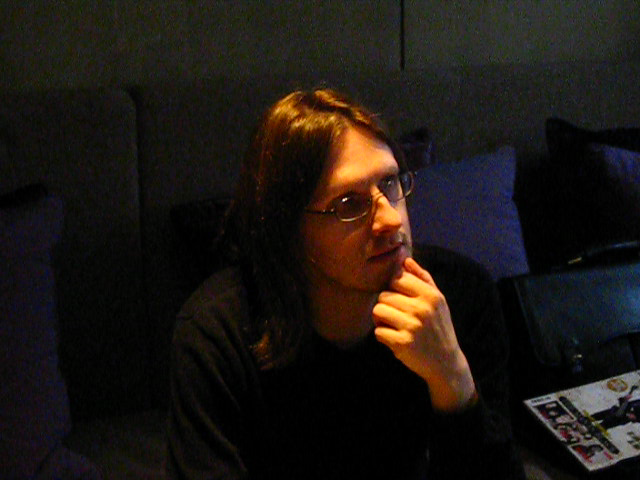 |
Your music sometimes is very dark, gothic. Why are you so attracted by such themes? Because I think that anyone that thinks about the world that we’re living and is curious about the world that we’re living is going to be confronted with the fact that the world is quite twisted place, you know, and you can now combine that with the fact that everyone who is not religious - I’m not religious - is going to be fascinated and obsessed and terrified with the idea of his own mortality. The fact that one day we will all cease to exist. If you don’t believe in the afterlife, and I don’t, then that is an incredible cross to carry around with you and you measure everything you do in life against the fact that you have this much time to be happy, this much time to find a person you’re supposed to be with, and lots of people never do, never get to the point where they say: “I’m happy in my relationship, I’m happy in my work, I’m content, I’m happy with my family”. So there’s a lot of unhappiness, and misery, and melancholy, you know. Now there’s not to say I’m that person, I mean of course there is something in my life I’m not happy about, nor I can’t say I’m completely happy about everything. But as someone who is worried about his own mortality and about the amount of unhappiness and regret and loss that is a part of everyone’s life, it’s hard to make happy music. I think it’s more natural to make sad music as a kind of reflection for other people to see themselves in and to make them feel that they’re not alone in feeling and experiencing these things. So I think in a very perverse way sad music becomes a music that makes you feel happy, or at least less alone in the world. I’ve always felt that, I’ve always been attracted to nihilistic or melancholic music. I can’t explain any best than that. You’ve told you’re not religious, but a lot of spirituality comes out from your speech. Yes, but I think spirituality is a different thing. Religion is believing in some kind of a propaganda, if you wanna call it, or some kind of fairy tale, as I see. I don’t believe in that, but I believe there is something inherently good about human beings. I don’t believe that people are born evil. I think they are naturally kind to other people, naturally empathic to all the pain and suffering of other people. If they’re not it’s because it has been twisted out of them by circumstances or something. So I believe that people are naturally spiritual and naturally empathic. But I don’t think there’s any connection really between that and our concept of organized religions and our concept of an afterlife. “Luminol” has been played live months before you recorded it. When performing it the very first time, did you expected the audience welcome it in such a way? No, they really loved it. I was very pleasantly surprised. Usually what happens when you’re on tour is that the audience want to hear all the stuff they already know from the records, and when you say: “ok, now I’m gonna do a new song”, they yawn. But this time they actually… Possibly Luminol many nights has got the best reaction of all, which was amazing. That told me that it’s a very good sign, a very good omen, for the new record. |
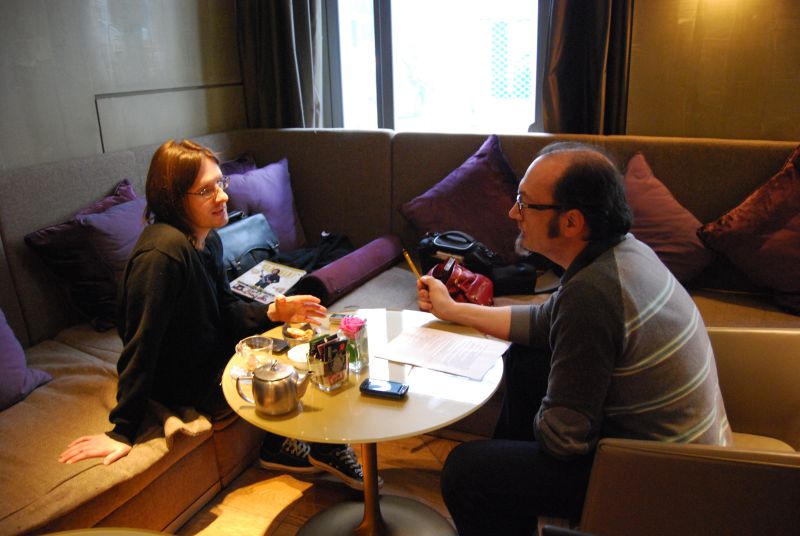 |
Great part during your shows has the astonishing imagery by Lasse Hoile, your long time collaborator. How did you two work together in plotting out such a concert film? I met Lasse because he was a fan, a fan who had a great talent. He showed me his work and I loved it and I think that was the last time when felt that his own work somehow seemed like it had the same qualities as my music, the same obsessions, the same surrealistic kind of qualities. So it felt like a very good compliment to the music. With the live show, what I used to do with Lasse was to sit down with him and I explained to him the lyrics, so the images. Usually we discuss movies that we’ve seen and we like, and scenes of movies that we’ve seen and we like, and use them as a kind of reference point. Then he goes away and create something to bring back to me and we discuss again. So it’s a way of trying to find a visual interpretation of the music. Some prog lovers say that the most of present prog artists must be called "regressive", because they didn’t make anything really new. You are one of the few who are considered interesting and fresh. How do you live this situation? I think the answer is actually quite simple. The answer is that I love all kinds of music, I don’t just like one kind of music. And I think part of the problem with some of the bands you’re talking about is that they’re so stuck in one listening and enjoying and appreciating one kind of music, that you can’t help but imitate in the way. The thing is I like so many different kinds of music that it all gets mixed stuff inside me. I mean this album is quite old school, progressive in a way this record, but at the same time I think still my personality comes through, still the fact that I like everything from drone music to japanese noise music, to electronic music, to jazz music, it all comes through. You know they say the great artists are the ones that steal. If you look at the Beatles, Led Zeppelin, you’ll see how much they stole, but it sounds like Beatles and Led Zeppelin, it doesn’t sound like Robert Johnson, it doesn’t sound like Willie Dixon, it doesn’t sound like Chuck Berry. I think that if your sound is strong enough, your personality is strong enough, you can steal and it still sounds fresh somehow. |
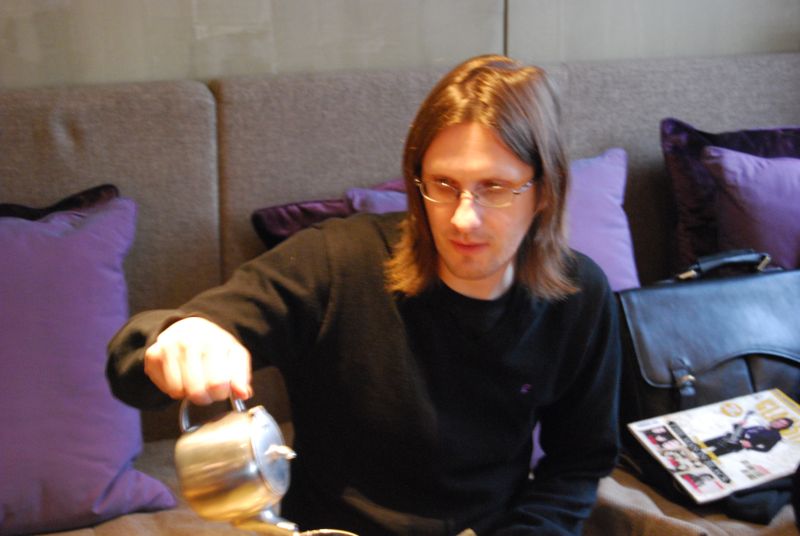 |
You presently are a point of reference for the new prog generation. What do you think could be due to? A lot of new young musicians are inspired by you, by your music and band. Right, I mean when you’re young it’s very important to have people that you’re influenced by, new heroes, new records. I just wish that some of the people that were influenced by me would do something more interesting. I don’t really hear a lot of modern progressive music that sounds very… Well, when I’m on tour I get CDs every day, fans give me CDs. One of the worse thing I can hear is something like: “Steve, wanna give you my demo, please listen to it, It’s really influenced by your music, it sounds just like Porcupine Tree, you’re gonna love it”. But no! I’m not gonna like it. Why would I like it if it sounds like Porcupine Tree? It’s not gonna sound as good as Porcupine Tree, is it? Why my God I like it! And I think that kind of thought process is strange to them. Well you know when I was eighteen years old my aim was to do something that sounded exactly like Pink Floyd too, but now that would be negative for me. I think it takes time as you’re a young musicians to work through your influences and develop your own style. I haven’t heard a lot of modern progressive music that I felt I was very interested, I must say. Which is the greatest satisfaction happened to you in your musical career? This is a difficult question to answer because it’s hard to pick a particular moment or event, but I think the greatest satisfaction in my musical career really is the fact that I’m still here, and I’ve never compromised, I’ve never had to make music for the wrong reason. May be at the beginning I did commercial stuff, but what I’m saying is that when I get my own music I never had to think about pleasing anyone else, or being commercial, or being played on the radio. And I think to have managed to do that in the modern music business. It’s really hard and there’s not many people that can say that. So I think that my greatest musical satisfaction is to be someone who is completely “my own man” and no having to care really what industry aspects me to do. |
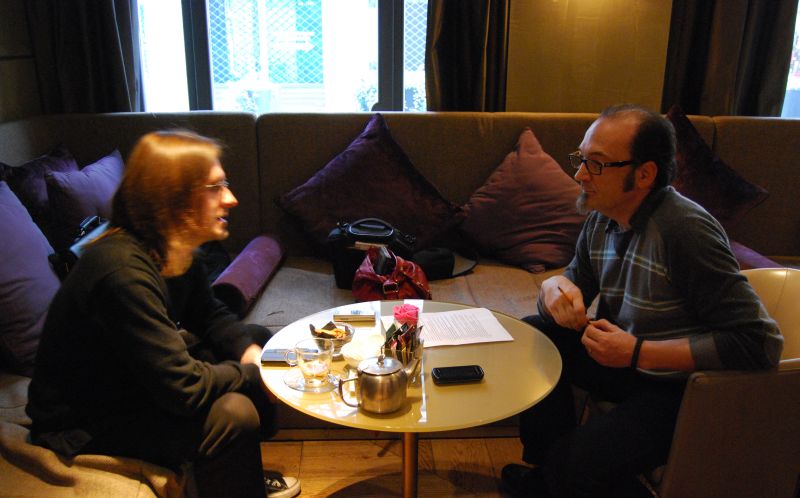 |
You have worked with a lot of artist during the years. What drives you to seek the collaboration of so many different musicians? Because it’s fun! You know, one of the great things about my job, if I can call a job, is that I get to meet people, I get to travel, and I get to work with lots of different people as part of my job, and some of them become very close friends, you know. That’s unusual that people meet their partner or their best friend thought their job. The more people I get to meet or work with the more friends I make, the more fun I have, the more drinking I do, the more partying I do. Because I love so many different kinds of music I’m attracted to work with many different musicians from many different countries, many different musical styles. It’s fun. That keeps you excited, that keeps you fresh. So many engagements may take away time and energies from your main projects. I don’t feel that way. I feel that everything I do fits in the positive way, but you’re right in the sense that obviously I can’t do everything. I’m doing this now, which means I’m not doing Blackfield, I’m not doing Porcupine Tree, I’m not doing No-Man. So, in that sense I have to purse right now what I want to do. But I guess I just follow my instincts. I go and I make the music I’m most interested in, at any given moments. Having worked on so many records, is it easier or more difficult for you to face a new album? More difficult. It gets harder every time. You know, the blank page, the metaphorical blank page, is the scariest thing of all. How do you call something out of the air, how do you create something from nothing, it’s something that wasn’t there minutes ago and is now something, how do you create a baby from nothing. It’s really really really hard. And it is harder with every album because I think in the sense that I don’t want to repeat things I’ve done in the past, ‘cause it’s boring to me, it’ boring to the fans, it’s boring to me about doing the same things again, so I’m always trying to do something different and that gets harder every time, of course it does, because the more albums you make, the more things you cross off: “I’ve done that, I’ve done that, I’ve done this”. It’s very hard. Which band of those you loved as a young listener are you still linked to? Oh so many. I mean I think that the music I discovered when I was very young, the first music that ever really excited me will always be part of me. When I was a very young kid there were three bands, King Crimson, Pink Floyd, Tangerine Dream, my three favourite bands. I know always whenever I hear their music the feeling of warmth will always be there. Also the Electric Light Orchestra, Jeff Lindon... I was a massive fan when I was a kid. The music of Abba which I used to hear my parents listening to when I was young. There is so much music from my childhood. I’ll tell you the music that has disappeared from my life. It’s mainly the music that I listened to in my twenties. It doesn’t have no meanings to me anymore. The music I loved when I was very young, when I first discovered music, is still very special to me. |
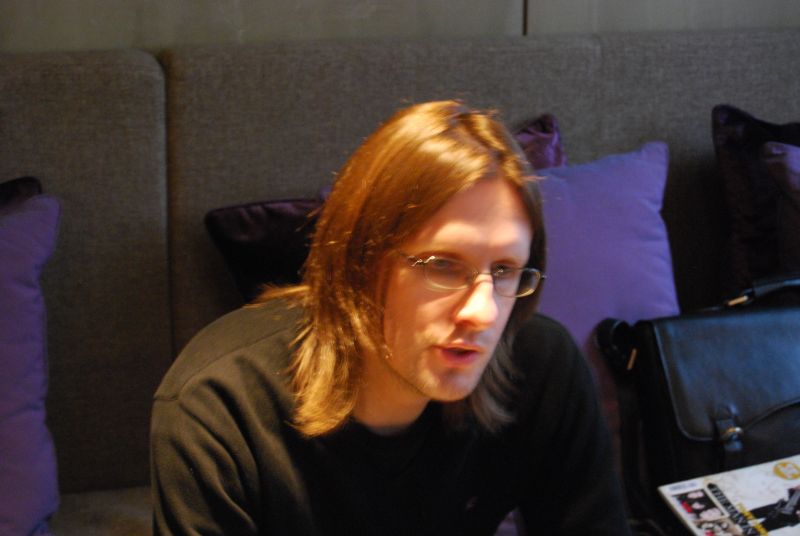 |
In your opinion, which are the bands nowadays playing interesting music? Opeth. An american band called Swans, do you know Swans? An amazing band. Another american band called Shearwater, from Texas. I’ve loved that band. These three. What about you? Any bands do you recommend? Three of Joey Eppard, they’ve played with you and Porcupine Tree. Oh Three, yes, that’s a very good band. As regards yourself producing other musicians, could you point out any band you would love to work with in future? You mean an old band or a new band? A new band. No. No, really. I think for me most of the people I want to work with now are people I want to work with because I’m a fan of their back catalogue. You know, I would like to work with Rush. I loved Rush very much. And I’d like to work with Scott Walker, with Neil Young. This may would be the biggest thrill to work with someone who was in my childhood like a hero of mine. New bands? I’ll talk with you about new bands. It’s hard to me to be really impressed by new music and also new bands can be a hard work because they’re still inexperienced. I’ve worked with some new bands. I’ve worked with bands over the years that were kind new. I think I had the most pleasure out of working with the more established artists, more experienced bands like King Crimson and Jethro Tull, ‘cause I get to meet people I’m a fan of too, you know, it’s such a buzz for me. |
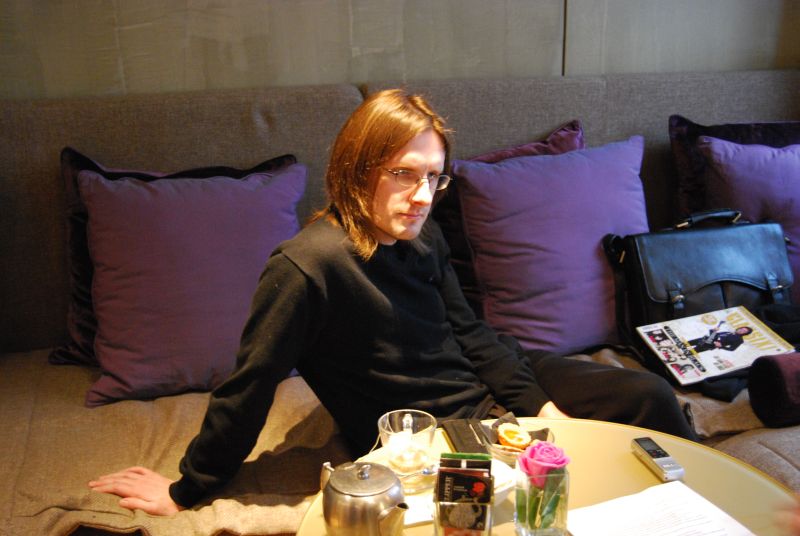 |
If you were told to compare you music to a movie genre, which one do you think would fit the best? Wow. Depends on the album, you know, because my albums are all different. The Raven is probably... you know... some kind of gothic ghost story movie, maybe a David Lynch movie, or something I don’t know, let me think about that... Next question? Feelings that springs out from your music are often distressing, kind of gloomy. Loneliness and alienation fill most of your lines. Which are your deepest fears? I think we’ve already talk about that, I think my deepest fear, like a lot of people, is my own death, my own mortality. You know people call me workaholic a lot, because a do a lot of work, a produce solo music. I think part of that, part of that driving, part of that motivation, comes from the fear of mortality, the idea that one day, soon, sometime in the next fifty years, I’m gonna cease to exist. That’s I think about a lot, but of course it’s also in the back of my mind when I write any song. This always is in the back of your mind, this you know. So my fear is to die in pain. I just would hope my death is not a painful one. I don’t deal with pain very well. I’m not a very brave person, I’m a week person. I hate pain, I can’t suffer. So I’d just want to die suddenly and not even know about it. It seems that you’ve tried to face some philosophical aspects of life. Do you mean to wake up people about the reality that surrounds them, or it’s just a personal reflection? I think it’s personal. I mean that when you make music you’re of course in a way going to reflect. To the people that listen to music you don’t reflect back some of the world that they’re living but at least the perspective of the world that you’re living. And you hope that people will empathize with your perspective and your view, but at the same time you’re making music, you’re making pop music, and pop music is supposed to be something that people can enjoy. You don’t want to feel like you’re trying to awaken them on politics. So I think it’ a very fine balancing line. I like music that is soulful, that can be appreciated intellectually as well as spiritually. That’s not easy. That’s not an easy balancing line to create but I think the best music for me has that mixture. All of us have had some hard times in their life. Would you like to share some of yours with us? I think I’ve already had with the music. I think I’ve already had. I don’t specifically want to talk about my troubled relationships, my problems with my family, but, you know, I think I’ve already had if you listen to some of the songs. Every song I write has an element of autobiography in it, has an element from my life. If it didn’t you wouldn’t believe it, you’d feel it was fake. This is the last question. If you mind, you can end this interview with something you have in aim to say. A kind of message to the Italian audience. You’re free. Who are we talking to? What is your… a magazine or a website? A music website. Ok. Well, Italy has always been a very very special country for me in my musical career since the beginning. Italy was the first place the Porcupine Tree ever came and played outside of UK, and was the first place we ever came and we realized we had fans. And it was a very exhilarating, thrilling and exciting experience. And ever since Italy has always been a very special place for me, and Italian people were very special people, so I’d like to thank music lovers in Italy for being so encouraging, being so supportive, over the last… wow… it’s twenty years there! And I still was absolutely glad of coming back, I will look forward to coming back to play in Italy. So help us see some of your readers on tour. Thank you Steven. It’s a pleasure. Other interviews: 2015 Reviews (only in italian): Insurgentes (dvd); Grace For Drowning; The Raven That Refused to Sing; Hand Cannot Erase; 4 1/2; To the Bone; The Future Bites; The Harmony Codex Web Site Related Artists: Porcupine Tree; No-Man; Blackfield |